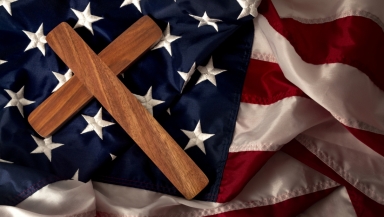
(CP) For the second year in a row, Illinois has ranked as the best state for religious liberty because it has the most safeguards in place, while a majority of other states continue to lack adequate protections for people of faith.
The Center for Religion, Culture and Democracy at First Liberty Institute released its third annual Religious Liberty in the States report last week. The report ranks all 50 states based on the presence or absence of religious liberty safeguards. For the second year in a row, Illinois was ranked the best state for religious liberty, while West Virginia was ranked the worst.
However, Illinois' overall score of 81% marked a 4% drop from the 85% it received last year. While West Virginia received the lowest score among all 50 states, it saw its score nearly double from 14% last year to 24% this year.
The report, titled "Religious Liberty in the States," took 16 religious liberty safeguards into consideration when assigning scores. Illinois' 81% score reflects the fact that it has the most safeguards in place, only lacking protections for public officials who don't want to perform same-sex weddings, for-profit businesses that don't want to provide services for such an occasion, those who don't want to perform abortions in the case of a medical emergency, and protections guaranteeing that houses of worship are not forced to close.
Illinois has all other religious liberty safeguards in place, including absentee voting for religious reasons, general conscience protections for healthcare workers, protections for healthcare workers who do not want to perform sterilizations, protections for healthcare workers who don't want to prescribe contraception, health insurance mandate exemptions for employers who don't want to cover abortions and sterilizations, as well as protections for clergy and religious entities that don't want to be required to perform same-sex wedding ceremonies.
Additionally, Illinois allows minors to consume alcohol as part of a religious ceremony, has a Religious Freedom Restoration Act in place, allows exemptions to childhood vaccine requirements for religious reasons and permits excused absences from school for religious reasons.
Across the United States, the most commonly adopted religious liberty safeguard is exemptions to health insurance mandates. The following states do not have exemptions to immunization requirements: California, Colorado, Georgia, Hawaii, Iowa, Michigan, New Hampshire, New Jersey, New York, North Carolina, Oregon, Vermont, Virginia and Wisconsin lacking complete protections in this area. Only California, Connecticut, Maine, Mississippi, New York and West Virginia.
All but eight states — Alabama, Kentucky, Louisiana, Mississippi, New York, South Carolina, Texas and West Virginia — allow absentee voting for religious reasons.
Exactly one-half of the states have a Religious Freedom Restoration Act on the books, specifically Alabama, Arizona, Arkansas, Connecticut, Florida, Idaho, Illinois, Indiana, Kansas, Kentucky, Mississippi, Missouri, Montana, New Mexico, North Dakota, Oklahoma, Pennsylvania, Rhode Island, South Carolina, South Dakota, Tennessee, Texas, Virginia and West Virginia.
Only 19 states allow clergy to refrain from participating in same-sex weddings: California, Connecticut, Delaware, Florida, Hawaii, Illinois, Maine, Maryland, Minnesota, Mississippi, Nevada, New Hampshire, New York, Oklahoma, Rhode Island, Texas, Utah, Vermont and Washington.
Similarly, only 18 states protect houses of worship from forced closure: Alabama, Arizona, Arkansas, Florida, Indiana, Kentucky, Louisiana, Montana, New Hampshire, North Dakota, Ohio, Oklahoma, South Carolina, South Dakota, Tennessee, Utah, Virginia and West Virginia.
Less common religious liberty safeguards include general conscience protections for healthcare workers, which only Alabama, Arkansas, Florida, Illinois, Mississippi, Montana, New Mexico, Ohio, South Carolina and Washington have in place.
Only four states allow public officials to recuse themselves from performing same-sex weddings: Mississippi, Nebraska, North Carolina and Utah. Mississippi is the only state that allows for-profit businesses to opt out of providing services for same-sex weddings.
Besides Illinois, other states that received a score of at least 50% on the issue of religious liberty were Florida (73%), Montana (66%), Arkansas (66%), Mississippi (65%), Ohio (65%), South Carolina (64%), Utah (61%), Washington (59%), Maryland (58%), New Mexico (56%), North Dakota (52%) and Hawaii (51%). Joining West Virginia in the bottom 10 were Alaska (29%), California (29%), Vermont (29%), Wyoming (30%), New York (33%), New Jersey (33%), Colorado (34%), Michigan (35%) and New Hampshire (35%).













